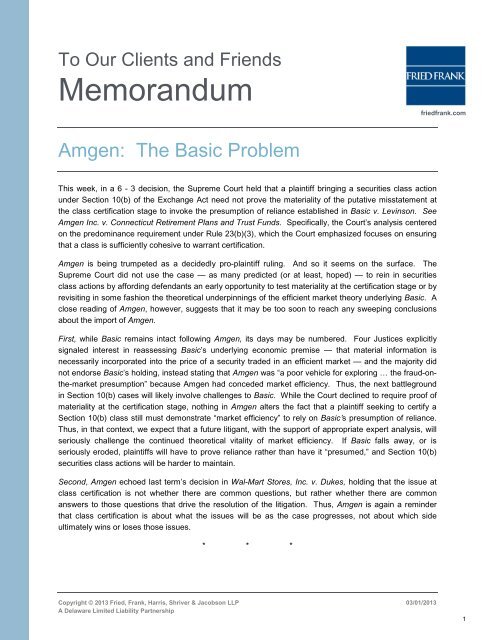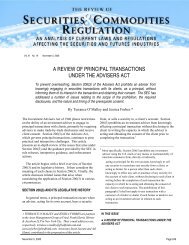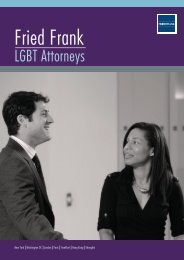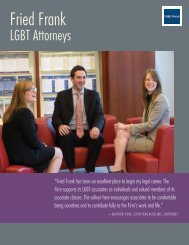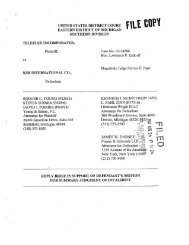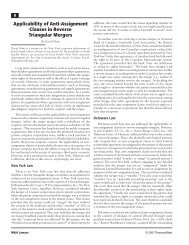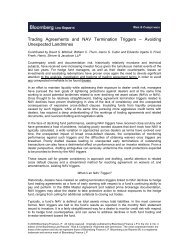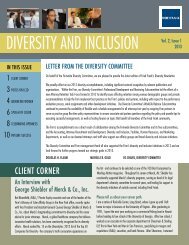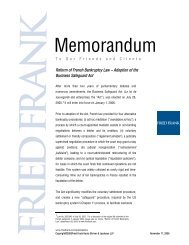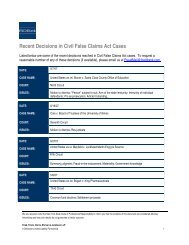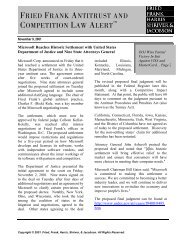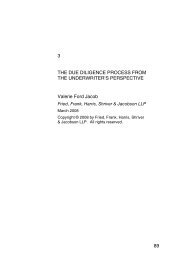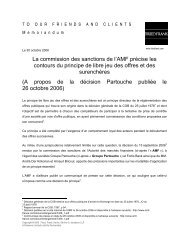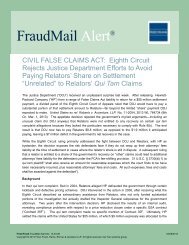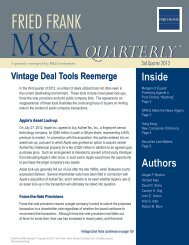Amgen: The Basic Problem - Fried Frank
Amgen: The Basic Problem - Fried Frank
Amgen: The Basic Problem - Fried Frank
You also want an ePaper? Increase the reach of your titles
YUMPU automatically turns print PDFs into web optimized ePapers that Google loves.
To Our Clients and Friends<br />
Memorandum<br />
friedfrank.com<br />
<strong>Amgen</strong>: <strong>The</strong> <strong>Basic</strong> <strong>Problem</strong><br />
This week, in a 6 - 3 decision, the Supreme Court held that a plaintiff bringing a securities class action<br />
under Section 10(b) of the Exchange Act need not prove the materiality of the putative misstatement at<br />
the class certification stage to invoke the presumption of reliance established in <strong>Basic</strong> v. Levinson. See<br />
<strong>Amgen</strong> Inc. v. Connecticut Retirement Plans and Trust Funds. Specifically, the Court’s analysis centered<br />
on the predominance requirement under Rule 23(b)(3), which the Court emphasized focuses on ensuring<br />
that a class is sufficiently cohesive to warrant certification.<br />
<strong>Amgen</strong> is being trumpeted as a decidedly pro-plaintiff ruling. And so it seems on the surface. <strong>The</strong><br />
Supreme Court did not use the case — as many predicted (or at least, hoped) — to rein in securities<br />
class actions by affording defendants an early opportunity to test materiality at the certification stage or by<br />
revisiting in some fashion the theoretical underpinnings of the efficient market theory underlying <strong>Basic</strong>. A<br />
close reading of <strong>Amgen</strong>, however, suggests that it may be too soon to reach any sweeping conclusions<br />
about the import of <strong>Amgen</strong>.<br />
First, while <strong>Basic</strong> remains intact following <strong>Amgen</strong>, its days may be numbered. Four Justices explicitly<br />
signaled interest in reassessing <strong>Basic</strong>’s underlying economic premise — that material information is<br />
necessarily incorporated into the price of a security traded in an efficient market — and the majority did<br />
not endorse <strong>Basic</strong>’s holding, instead stating that <strong>Amgen</strong> was “a poor vehicle for exploring … the fraud-onthe-market<br />
presumption” because <strong>Amgen</strong> had conceded market efficiency. Thus, the next battleground<br />
in Section 10(b) cases will likely involve challenges to <strong>Basic</strong>. While the Court declined to require proof of<br />
materiality at the certification stage, nothing in <strong>Amgen</strong> alters the fact that a plaintiff seeking to certify a<br />
Section 10(b) class still must demonstrate “market efficiency” to rely on <strong>Basic</strong>’s presumption of reliance.<br />
Thus, in that context, we expect that a future litigant, with the support of appropriate expert analysis, will<br />
seriously challenge the continued theoretical vitality of market efficiency. If <strong>Basic</strong> falls away, or is<br />
seriously eroded, plaintiffs will have to prove reliance rather than have it “presumed,” and Section 10(b)<br />
securities class actions will be harder to maintain.<br />
Second, <strong>Amgen</strong> echoed last term’s decision in Wal-Mart Stores, Inc. v. Dukes, holding that the issue at<br />
class certification is not whether there are common questions, but rather whether there are common<br />
answers to those questions that drive the resolution of the litigation. Thus, <strong>Amgen</strong> is again a reminder<br />
that class certification is about what the issues will be as the case progresses, not about which side<br />
ultimately wins or loses those issues.<br />
* * *<br />
Copyright © 2013 <strong>Fried</strong>, <strong>Frank</strong>, Harris, Shriver & Jacobson LLP 03/01/2013<br />
A Delaware Limited Liability Partnership<br />
1
<strong>Fried</strong> <strong>Frank</strong> Client Memorandum<br />
Authors:<br />
William G. McGuinness<br />
Douglas H. Flaum<br />
Gregg L. Weiner<br />
Stephanie J. Goldstein<br />
David B. Hennes<br />
Israel David<br />
This memorandum is not intended to provide legal advice, and no legal or business decision should be<br />
based on its contents. If you have any questions about the contents of this memorandum, please call one<br />
of the authors.<br />
Contacts:<br />
New York<br />
William G. McGuinness +1.212.859.8026 william.mcguinness@friedfrank.com<br />
Douglas H. Flaum +1.212.859.8259 douglas.flaum@friedfrank.com<br />
Gregg L. Weiner +1.212.859.8579 gregg.weiner@friedfrank.com<br />
Stephanie J. Goldstein +1.212.859.8254 stephanie.goldstein@friedfrank.com<br />
David B. Hennes +1.212.859.8355 david.hennes@friedfrank.com<br />
Israel David +1.212.859.8218 israel.david@friedfrank.com<br />
New York Washington, DC London Paris <strong>Frank</strong>furt Hong Kong Shanghai friedfrank.com<br />
2


